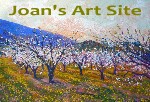Rhodes & Simi
Alan's Log:
Joan's Log:
September 2008
A Series of Unfortunate Events
After we dropped the kids off at the airport in Chios, we hot-footed it to Rhodes several hundred miles south.We only had five days turn-around time before our next guests, my sister Dewi, and her husband Steve, flew into Rhodes to meet us from Paris. We had three days of travel, a ton of laundry to do, as usual; we needed to reprovision, and do some serious boat cleaning. Plus we were both looking forward to spending some time in a sophisticated city after a summer in the harbours and rustic villages of the smaller Greek islands.
After three days of slogging into the wind, 12 hours a day, (this is the same wind that blew constantly from the North all summer. Now that we need to go South it is blowing from the South!) we arrived in Mandraki, the harbor of Rhodes Town,
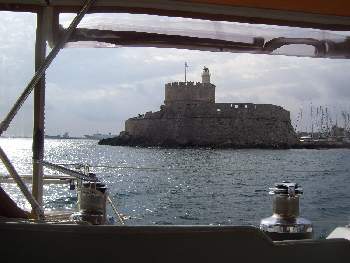
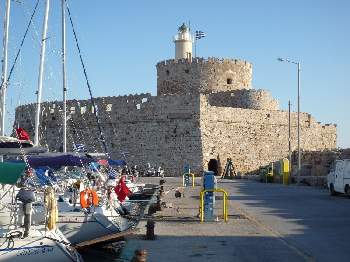
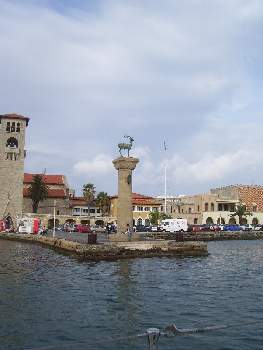
It was an enormous statue of Helios the sun god, and became known as 'The Colossus', made of bronze, from the melted-down shields and swords of a defeated invading army. The statue straddled the harbor entrance, only to fall down during an earthquake seventy years after being erected. The historic harbor area is like going back in time, a large medieval castle built by the Knights of St. John and it's fortifications engulf you as you enter. If you squint you won't notice the three cruise-ships looming on the other side of the harbor wall. My excitement and relief of arriving turned to concern as I realized the harbor was jam-packed full of boats. Even in the height of the summer season we have always found a place to moor in our travels through the Greek Islands. I assumed there would be plenty of room in Rhodes this time of year, plus we had never heard that Rhodes would be hard to get into. Now we know, it is! Very hard!
In the surprisingly small confines of Mandraki harbour, a third of the space is reserved for the yacht club boats, a third is for charter boats, a quarter reserved for excursion boats and ferries and that leaves about 10 spaces left for cruising boats. Every time we dropped an anchor and tried to back into a space that opened up we were yelled at and waved away. This happened about six times over three hours. My bright visions of stretching my legs on a long walk around the town started to fade. We had wasted hours circling, but we had no choice but to leave. That put us in a difficult situation, Rhodes doesn't have a lot of anchorages and a meltemi was starting to blow. Plus it was getting late in the day and with no local knowledge the only place we knew of close-by was an unfinished marina, way out on the outskirts of town. The words 'unfinished marina' didn't sound very appealing, especially after our experience in Mykonos, but we had run out of options. An hour later we were anchored in the unfinished marina. It is located in a vast desolate cement plant in an industrial part of town.
We heard that it was unfinished due to a Mafia feud and wondered who was entombed in the enormous concrete castings scattered around.
Two other boats were forlornly anchored out in the middle, one surprisingly, from Falls Church, Virgina, only a few miles from where I grew up. We soon found out the couple on the Virginia boat were NOT happy campers, their anchor was fouled (caught on the bottom) , and after two days and a hell of time trying to deal with it on their own they had hired a diver to help them sort it out to the tune of one hundred and fifty euros! We also found out the entire bottom of the marina was foul with debris and that it was extremely risky to anchor there. Later the second boat's anchor became fouled in strong winds and caused serious damage to their boat as they tried to retrieve their anchor.
They also wound up calling the diver and then had to head to Marmaris in Turkey for essential repairs to their broken bob-stay.
I ended up getting my walk after all, as we headed into town on foot, hauling about a hundred pounds of laundry! After dropping it off, we did a little investigation in the harbor area. We talked to a boat owner who had arrived before us and squeezed into a tight berth. He told us he had booked ahead six weeks ago, and spaces were very difficult to come by. If we had only known! He gave us the number of the service he had used to reserve his space. Alan called and discovered that yes, possibly we could get a space but it would cost us...one hundred and thirty euros ($200) for the service plus thirty euros a day, yikes! We hated the expense but felt we needed a good location with visitors arriving. As it turned out, even he was unable to find us a space. After two days, the bumpy conditions in the unprotected marina were deteriorating and so was my mood. Just getting ashore had become a nightmare, as the passarelle waved and bobbed from the chop, I felt as if I was "walking the plank" each time I tried to step off. We decided to take our chances and leave, thankfully our anchor came up! We tried our luck in the harbor again, but just as before we were shoed away from the few open spaces like annoying insects over and over. While trying to navigate around other boats (also looking for spaces) in the confines of the harbor Alan cut a tight circle, forgetting our dinghy tied off the bow and our dinghy flipped over! Much to the entertainment of all watching! I took the helm, while Alan was able to attach a halyard to it and lifted it up enough to turn it back over. Our oars and some small fenders gleefully escaped the carnage to freedom. After a few attempts to grab them we captured the fenders but could only watch in vain as our oars drifted away. Defeated and dejected we left the harbor and anchored outside the harbor wall along with eight or nine other cast-outs and rolled in the swell all night. Our plan was to grab a space left by a charterboat, as we had heard that some were scheduled to leave the next day, and their spaces could be used by cruising boats until they returned five days later. The trouble was there were at least nine other boats anchored out with us who wanted those spaces too. Alan was awake at 6:00 AM, and we were in the harbor by 7:00 AM, we were going to be first in line no matter what! And it worked, we got in, tied-up, and no one yelled at us!
So, next to Mykonos, Rhodes is our least favorite island in Greece. Sure it had a major castle and walled medieval old town, but it was beyond touristy! Although Alan did perk up at the sight of the northern European women my age and older, bringing "the girls" out for some sun and fun!
Rhodes was to become my nemesis, it just took me a while to realize it. I had looked forward to our arrival in this first city of the Aegean, but as we circled the harbour looking for a space along with half a dozen equally desperate yachts I found the answer to a question that had been puzzling me for over a year. We had just failed to get into a space that opened up as a charter boat left. As we positioned to drop our anchor and back in, a German cruiser nearly crashed into us and claimed that he had made a reservation for that particular space. I backed off and avoided contact, marvelling at his Germanic efficiency. We are never really sure when we will arrive anywhere and rarely even think of trying to make reservations. It was only later that I learned that there are NO reservations in Mandraki for the slip we were contesting. He just had a better game than I did.
Europeans tend to ask why Americans are so friendly, in a manner that suggests that it is a naive and foolish habit. It's an intriguing question, and one that I have never been able to answer to the satisfaction of the questioner, but finally I had the answer to the question that has been puzzling me. Why are European boaters so unfriendly and inhospitable?
We cruised U.S. waters, Bermuda, the Caribbean as well as the Azores and Portugal finding friendly cruisers from every nationality everywhere we travelled. Some became great friends but all were helpful, polite and courteous to a fault. Yet now we are in the Mediterranean; the cradle of civilization and we find very little courtesy or friendliness from the majority of our fellow European cruisers.
The penny finally dropped about the time that the German's anchor did. Here in Europe, not far from the ancient colliseums of the Romans, we are all engaged - whether we like it or not - in a gladatorial battle. The rules are simple. Today in Rhodes there were only two spaces and nine contestants. The most aggressive contestants get to tie up and eat dinner onshore. The other seven spend a frustrating wasted day circling in the harbour only to retreat to the anchorage in the late afternoon. It is a game played with the hard stare and the use of one's boat as a parrying sword-thrust. The hard fact is that there are simply more boats in some parts of the Mediterranean than there are spaces to put them. If you habitually cruise these waters you need to develop a thick skin and a game face. Its no good being friendly to another cruiser today if you plan to cut them off the next day in a race to the only available space in the harbour! It's quite sad really, and it doesn't really reflect on the Europeans, they have had to evolve to survive!
Later we took some time to reflect and determined that this is not a game that we enjoy and it's definately not one we choose to play, and for that reason alone we are glad that our time here is limited, as we would not want to suddenly find ourselves morphing into seaborne warriors equipped with the tools to win these battles!
In the heat of the battle, while musing on these intriguing questions, I made a huge mistake. We had short-tied the dinghy off the bow as we prepared to back into a space. I left it tied there as we conceded the space to the German boat, then promptly forgot about it as I continued to maneouver around the harbour. It was out of sight and out of mind. Before long it got stuck under the bow and turned over. The outboard engine flooded with salt-water and a variety of dinghy gubbins spread out over the harbour. It was only Joan's good navigating that let me jump down onto the upturned dinghy, put a halyard on it and right it. We tried to recover the oars but they had drifted too close to the moored boats for us to save them without endangering property. So we towed our sodden dinghy off in defeat, tail between our legs, to an anchorage that we had discovered just outside port.
Our dinghy is our car, but more than that, when we are at anchor - which is 70% of the time - it is our only means of getting off the boat! With one foolish move I had crippled it. I removed the outboard from the dinghy and hoisted it on board Moonstruck, where I started the long process of de-watering the engine/gearbox/carbueretor.
The next day we were able to find a place in Mandraki harbour, but only by being the most assertive boat in the harbour. It's not the way I want to be remembered - but we had a long list of chores to accomplish and and people to meet at the airport. Later, walking around the harbour I found one of our oars. The other is lost. Although I can scull slowly (with one oar) I am hoping that the repairs to the outboard will not make it necessary to exercise that skill.
We picked up Dewi & Steve at the airport later that evening and caught up with them. They had just withstood hurricane Ike in Clear Lake, Texas and had great stories to tell of neighbors helping one another through the post-storm recovery.
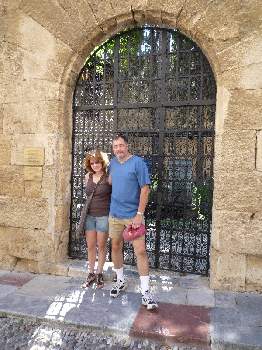
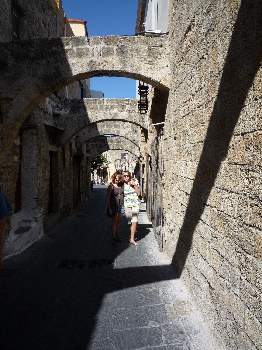
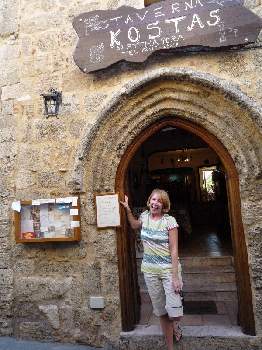
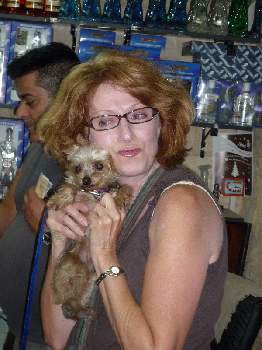
I started feeling better about humanity and the following day we all took a stroll through the fortified 'old town' of Rhodes, complete with castellated turrets and cobbled streets and hordes of tourists.
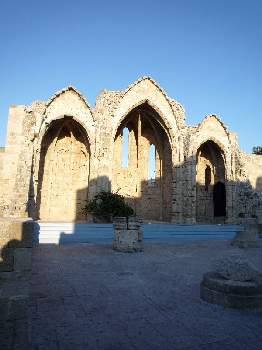
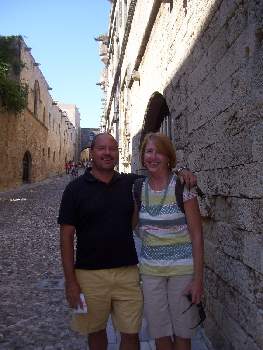
Joan and Dewi wanted to look in the shops, so I offered to buy Steve a beer in a charming small bar on the tourist track. My order of two beers was interpreted to mean, bring these two idiots the stupidly huge tourist glasses shaped like boots. So we sat there like two dummies trying to drink our beers from these glass boot monstrosities. I belatedly thought to ask the price and was told that our 'big beers' were €20 (around $30) each! It was outrageous. Then waiter laughed at us and I guess I kinda lost it at this point.
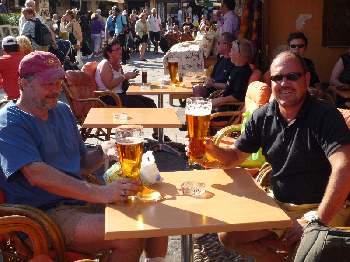
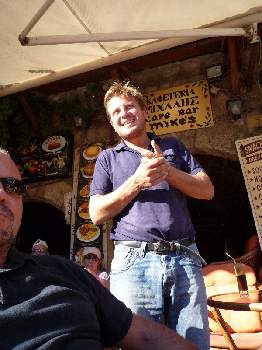
I took a picture of him laughing at our predicament and immediately discovered the power of the lens. He retreated from the camera as I was going on about posting his picture on the internet, then returned after a few minutes and said we could pay only for a 'small' beer. This was a more reasonable €5 each. We felt we had escaped lightly and left promptly.
I wish I had a redeeming story to tell about the fabled city of Rhodes, but even the tourist information office was in on the act. Rhodes is the only city in our travels where the city tourist information office actually charged us (€1) for the advertising-filled tourist city map.
We rented a car and visited Lindos with Dewi and Steve. Lindos is is a charming, picturesque town by the sea with a nice beach, built around a hill with a fortified castle on the top, but it was also overrun with tourists and worse, there was a donkey terminus, where the poor animals were hauling over-fed tourists up and down the hills of the town, we were always having to get out of the way! Just my opinion but it ruined it for me.
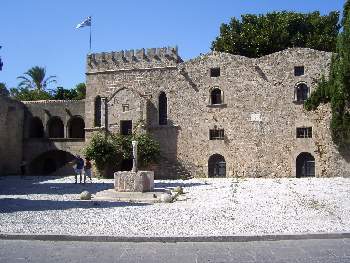
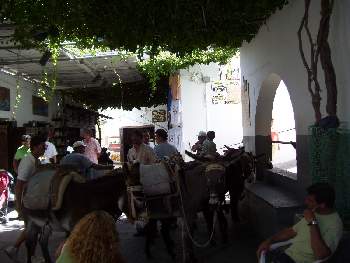
Although the weather had been spectatular, I felt bad we had suggested that Dewi and Steve meet us in Rhodes, and after our five days were up we left for the island of Symi.
Symi
Now that was a good idea! Only a few hours sail west of Rhodes, it is a small mountainous island with only one harbor town. But what a town!
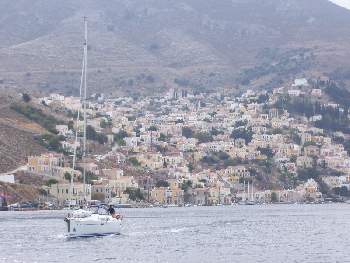
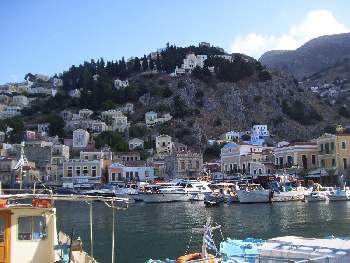
Gialos, one of the prettiest we have seen in all the Greek Islands. Many of the buildings had been freshly painted in a gorgous pallet of complementary colors. How refreshing it was to be back in a more authentic Greek atmosphere. Simi can become crowded with day-trippers from Rhodes, but they all leave after a few hours and it was pleasantly quiet in early October. Simi was once the sponge diving capital of the world, and although the sponges are no longer plentiful, there were plenty for sale in the shops.
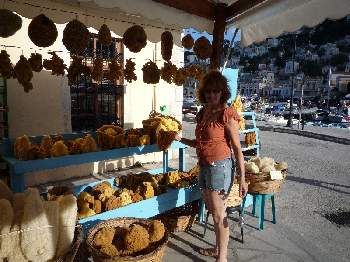
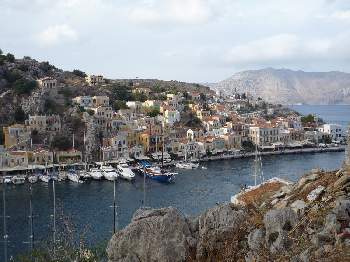
Simi was also a thriving ship-building center. In the upper levels of the town are the abandoned crumbling mansions from that era, which were fascinating to explore.
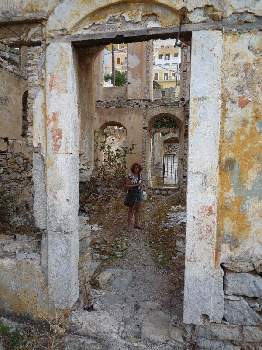
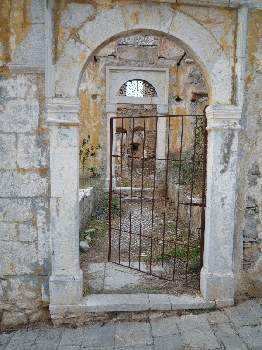
Gialos was built on a steep hill and gave us a great work-out with it's narrow stair-step passage ways.
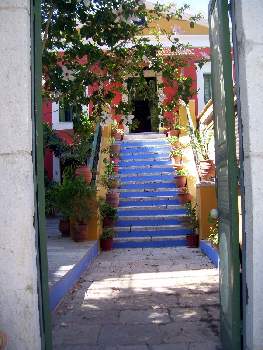
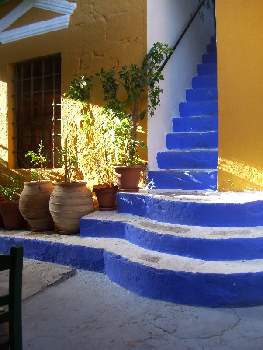
It was also a photographer's dream, especially in the early morning and late afternoon light. I took tons of pictures for my future paintings file.
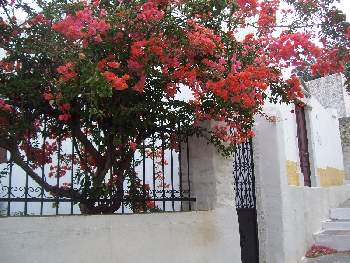
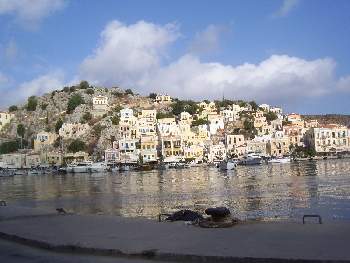
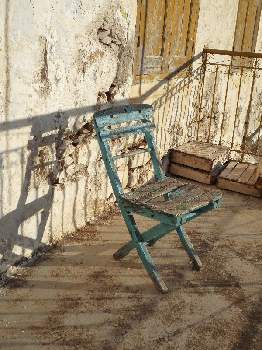
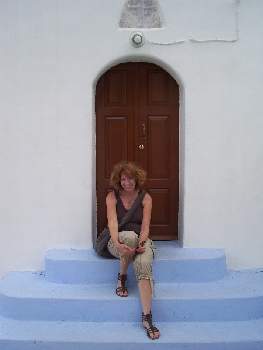
Simi is a cruisers destination and we met several here. One couple was from Anacortes, WA quite close to our hometown of Gig Harbor, WA. Another from Ireland. One had information to share on our future ports of call, and a problem with their wifi setup. The other needed help with an engine problem. It was good to be back among fellow cruisers who support one another.
One afternoon we took a walk to the upper levels of the town, I saw a building which at first I thought might be an old hospital, The gate wasn't locked and after peeking through the glass on the door I could see it was an old apothocary/pharmacy
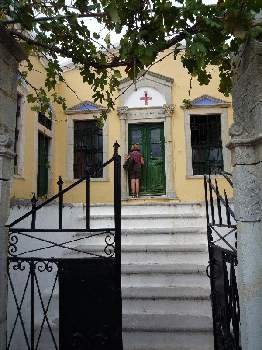
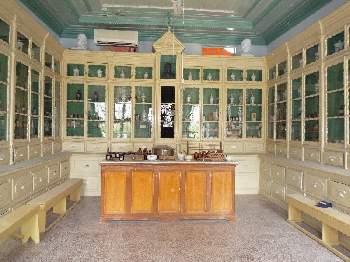
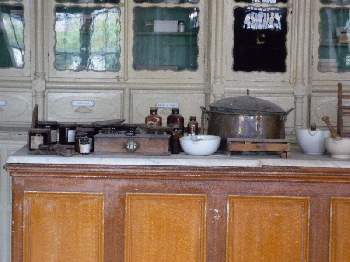
...looking as if the pharmacist had walked out many years ago and never returned, leaving the old-fashioned scales and morter and pestle on the counter, now covered with a thick layer of dust. Old apothocary jars lined the shelves, and the drawers were still labeled with medicinal herbs and ingredients, all in French. It had the look of being frozen in time.
We walked to the very top of the town where there was an old church, the gate was open, so we walked in and wandered around the courtyard. Although it was a Sunday, no one was there, or so we thought, till we turned around to find an old man watching us. For an moment I thought he was going to chase us away, instead he invited us in, sprinkled us with holy water and gave us a tour of the church. He spoke not one word of any language that we understood, but managed to show us the holy relics and convey his loathing for the WWII invaders who desecrated some of those relics and shot holes in a beautifully elaborate silver icon.
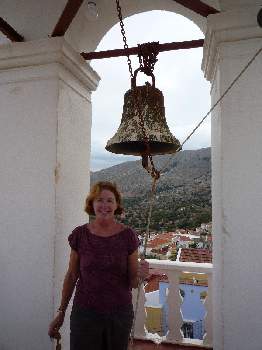
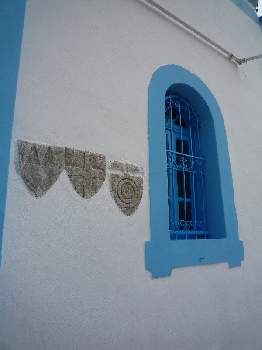
Then he grabbed us both by the arms and led us to the bell tower. We understood we were to climb up and I was wondering if he wanted us to ring the hour on the church bell. In the end we decided not to but enjoyed the view from the very highest point of the village.
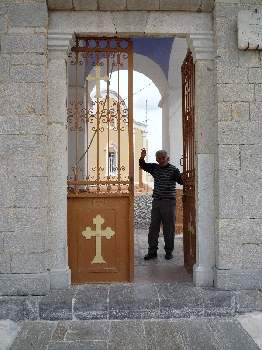
We waved good-bye to my sister and Steve as they departed on a ferry for Rhodes and then a long farewell to Greece as we set a course for Turkey. After spending three and a half months in the Greek Islands, it was time head towards Kemer, Turkey; Moonstruck's home for the winter.
I'm so happy our last island was so lovely. Despite our crazy "Meltemi Meltdowns" we had truly been enchanted by Greece, the rich, vibrant culture and the beauty of the islands will be lasting wonderful memories.
Next....We head to Turkey and explore a little of Turkey's Mediterranean coast before winter sets in.

